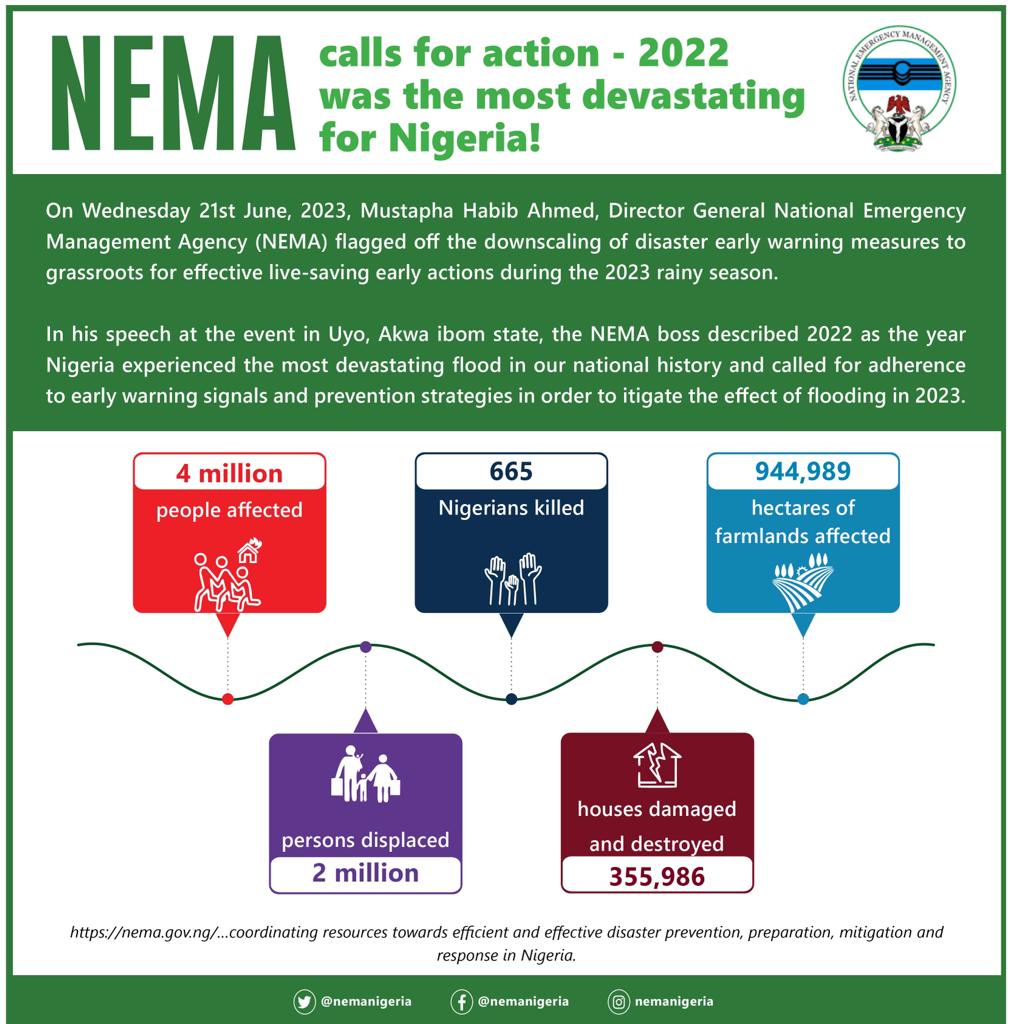News
NEMA and the flooding menace: prevention and warning as panacea – Toni Kan

The River Niger boat disaster which claimed over 100 lives along Patigi Local Government Area of Kwara state on Monday 12th June, 2023 and the flooding incident that submerged over 116 houses in the popular Trademore estate in Abuja on Friday June 23, 2023 have thrown into sharp relief the need for proactive disaster prevention and management especially as the rainy season intensifies.
As a corollary these incidents have also underlined the imperative of the National Emergency Management Agency (NEMA) which is charged with disaster management in Nigeria.
Established via Act 12 as amended by Act 50 of 1999, to manage disasters, NEMA spells out its mission on its website as having been set up to “coordinate resource towards efficient and effective disaster prevention, preparation, mitigation and response in Nigeria” The agency cites its vision as “to build a culture of preparedness, prevention, response and community resilience to disaster in Nigeria.”
NEMA has become a household name since the insurgency began roiling the North East over a decade ago and we began witnessing rising incidents of flooding and sundry natural disasters exacerbated by climate change and climate variability.
On Wednesday June 21, 2023, the Director General of NEMA, MUSTAPHA HABIB AHMED flagged off what the agency described as “the downscaling of disaster early warning measures to grassroots for effective live-saving early actions during the 2023 rainy season.”
The proactive awareness creation programme expected to impact all states in the country is predicated upon what the DG described as “NEMA’s paradigm shift towards disaster risk reduction and to take disaster risk management to the grassroots.”
Proactivity, prevention and mitigation are key words in the message NEMA is sending out and the messages are targeted at subnational level actors – states and local governments and communities – because as NEMA has noted disasters are often local and subnational level actors are usually the first line responders when they occur.
NEMA is able to offer proactive warning and prevention strategies because technological advances have made it easier to make forecasts and predict weather patterns and behavior, a fact the DG reiterated during his visit to Akwa Ibom state.
Ahmed in his speech at the event noted that “we can only achieve this through the deployment of scientific information in form of impact based predictions that constitute the foundation of early warning advisories and disaster risk mapping to be delivered to end users in disaster management and development planning.”
Early in the year, the Nigerian Meteorological Agency (NIMET) and the Nigerian Hydrological Services Agency (NIHSA) released their 2023 Seasonal Climate Prediction (SCP) and Annual Flood Outlook (AFO) respectively.
According to NiMET’s forecast published in January, Nigerians should prepare for “early onset of rainfall accompanied by flooding,” with torrential rains expected in the “coastal areas in the south-south, particularly Bayelsa, Akwa Ibom and Rivers.”
NIHSA in its 2023 Annual Flood Outlook (AFO), with the theme “Flood Prediction and its Impact on Socio-Economic Livelihood of Nigerians” warned that 178 Local Government Areas (LGA’s) in 32 States of the federation and the FCT fall within the Highly Probable Flood Risks Areas.”
NEMA has, in response to these dire prognostications, embarked on its awareness and mitigation campaign as Ahmed noted in Uyo.
“It is on this premise that NEMA drawing from its mandate of disaster risk management decided to take the initiative of partnering with NIHSA and NiMet to downscale early warning alerts to States, Local Government Authorities and communities at risk of flood disaster and associated hazards.”
But why the choice of Uyo as flag-off point? The DG of NEMA explained that it was on account of what he described as “the existing mutual support and collaboration between NEMA and the Akwa Ibom government,” where NEMA has set up an operations office with a promise from the state government of “office accommodation and warehouse facility to enable the prepositioning and stockpiling of relief items for easy deployment in the event of an emergency.”
The ongoing downscaling of disaster early warning measures is also important in consideration of the fact that Nigeria was severely impacted by flooding in 2022 which NEMA has described as the year in which the country experienced the most devastating Impact of flooding since record keeping began.
Flooding affected over 4 million Nigerians last year, killed 665 and displaced over 2 million persons, caused damage and destruction to about 355,986 houses and 944,989 hectares of farmlands.
The breathtaking scale of death and destruction is at the core of NEMA’s proactive measures with a focus on four key areas – Preparedness, Mitigation, Response and Recovery.
While preparedness and Mitigation can be directed centrally through the deployment of credible information and development of the right plans, Response and Recovery require intervention at the subnational levels because disasters often happen in local communities which means that first responders are often from within the state or local government.
NEMA as part of its downscaling measures is supporting capacity building efforts as well as funding and provision of equipment to upskill Local Emergency Management Committees (LEMCs) to equip them and make them ready to “take disaster risk management to the communities to build safe and resilient communities and by extension a safer and resilient Nigeria.”
The rains are here, the message is going out and one hopes that by the time we take stock at the end of the year, the toll would be nowhere near as devastating as it was in 2022 thanks to NEMA’s proactive activities.
Toni Kan , writer and PR and Developmental expert writes from London
News
62-year-old man who received first-ever pig kidney transplant dies two months after surgery

A 62-year-old Rick Slayman, the first patient who received the world’s first transplant of a genetically modified pig kidney, has died nearly two months post-operation, Massachusetts General Hospital announced.
Massachusetts General Hospital (MGH), United States announced the development on Sunday saying there was no indication his death was as a result of the transplant.
On March 16, surgeons at the hospital transplanted a pig’s kidney into 62-year-old Richard Slayman, a living human recipient, for the first time.
The hospital said a genetically-edited pig kidney was used for the “successful” surgery, which took four hours.
Slayman has been living with type 2 diabetes and hypertension for years.
He was on dialysis for many years before receiving a kidney transplant from a deceased human donor in December 2018.
The kidney began to fail about five years later and Slayman was forced to resume dialysis in May 2023.
The patient was discharged from hospital in April, almost three weeks after the operation.
Slayman’s relatives said his story was an inspiration and said one of the reasons he underwent this procedure was to provide hope for the thousands of people who need a transplant to survive.
“Rick accomplished that goal and his hope and optimism will endure forever,” he said.
“To us, Rick was a kind-hearted man with a quick-witted sense of humour who was fiercely dedicated to his family, friends, and co-workers.”
News
NMA announces new executive leaders, Bala Audu elected president

The Nigerian Medical Association (NMA) has announced the election of new executive leaders at its 2024 Annual Delegates Meeting held in Calabar, Cross River State.
The association aims to harness the collective strengths of its members to advance healthcare delivery across the nation.
Bala Audu, Professor of Obstetrics and Gynaecology and the current Vice-Chancellor of the Federal University of Health Sciences in Azare, Bauchi State, has been elected as the National President of the NMA.
Prof. Audu is set to lead the association for the next two years, alongside a team of newly elected executives.
- Dr. Benjamin Olowojebutu, previously the NMA Chairman for the Lagos Zone, will serve as the National 1st Vice-President.
- Dr. Usha Anenga steps in as the 2nd Vice-President. The roles of National Secretary General and Deputy Secretary General will be filled by Dr. Ben Egbo and Dr. Wale Lasisi, respectively.
In his statement, Dr. Olowojebutu emphasized the collaborative spirit within the NMA, highlighting that the association represents a diverse community of healthcare professionals each contributing unique talents and perspectives.
“There are no winners or vanquished in our association, only colleagues bound together by a common dedication to the health and well-being of our members and communities,” he remarked.
Dr. Olowojebutu also stressed the importance of unity and solidarity in overcoming the challenges faced by the healthcare sector in Nigeria. He acknowledged the crucial roles all members play, regardless of the election’s outcome, in shaping the future of the profession and the national health system.
This new leadership team is expected to bring renewed vigour to the NMA’s efforts in improving healthcare delivery, advocating for medical professionals, and ultimately enhancing the well-being of communities across Nigeria.
News
Tijjani Babangida’s one-year-old son dies as wife loses eye in car crash

Tijjani Babangida, the former Super Eagles player, has lost Fadil, his one-year-old son, in a car crash involving his family along the Kaduna-Zaria highway.
Last Thursday, Babangida was travelling with his family — Maryam, his wife, their son, and Ibrahim, his brother — and his maid when the car incident occurred.
Ibrahim was said to have died on the spot while the other occupants in the vehicle were rushed to the hospital.
But in a recent update, Harrison Jalla, chairman of the Professional Footballers Association of Nigeria (PFAN) Task Force, disclosed that Babangida’s son also died due to injury sustained in the accident.
“Yes he eventually lost the son, a one-year-old boy,” Jalla told TheCable on Sunday evening.
Babangida’s wife is also said to have lost an eye due to the severe injury to her face. She is said to be receiving treatment at the intensive care unit of the Ahmadu Bello University Teaching Hospital, Zaria.
It is also reported that their maid suffered a fracture in her leg.
The Nigerian Football Federation (NFF) on Sunday paid a courtesy visit to Babangida at the hospital.
The delegation consoled the former Eagles player over the deaths of his brother and son. They also prayed for a quick recovery for Babangida and his wife, “who has undergone a successful facial surgery”.
Babangida is the president of PFAN and was a member of the Nigeria U-23 team that won the gold medal in football at the 1996 Olympics in Atlanta.
He had a decade with the Super Eagles, where he became famous for his speed down the wings.
-

 Entertainment4 days ago
Entertainment4 days agoTems announces release date for her debut album ‘Born In The Wild’
-

 Entertainment7 days ago
Entertainment7 days agoKanayo introduces first son to filmmaking (Video)
-

 Business7 days ago
Business7 days agoNERC reduces FX rate for calculating new tariff for Band A customers by 16.03%
-

 Crime7 days ago
Crime7 days agoNigerian vendor in UK, Musiliu Badejo jailed for selling toxic skin bleaching products
-

 Business7 days ago
Business7 days agoCBN directs banks to charge 0.5% cybersecurity levy on electronic transfer
-

 Business7 days ago
Business7 days agoNaira depreciates at parallel market, appreciates at official window
-

 Business7 days ago
Business7 days agoFive levies Nigerians pay for electronic transactions
-

 Entertainment7 days ago
Entertainment7 days agoPortable acquires luxury house in Lekki (Video)


















